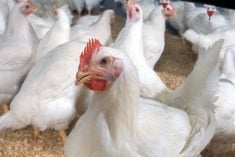Saskatchewan has reported a case of West Nile Virus neurological syndrome even as cooler weather arrived to drive down the risk.
Provincial chief medical health officer Dr. Saqib Shahab said Sept. 20 that a man in his 60s is hospitalized in Five Hills Health Region, which includes an area around Moose Jaw.
Another six suspected cases of the milder form of the virus are under investigation.
Shahab said one other case was confirmed earlier through screening at Canadian Blood Services. That person displayed no symptoms.
Read Also

Confusion cleared on Canadian calf import changes
A Canadian Food Inspection Agency (CFIA) announcement on import regulations for feeder calves caused some confusion on the administrative side of Canada’s cattle industry earlier this month
Of the total, two are from the Saskatoon area, two from Regina, three from the Cypress Hills area and the one in Five Hills.
“The risk is still low but not zero,” he told reporters.
People who work in barns or in areas with thick vegetation or a coulee where the frost hasn’t fully hit could still be bitten by the culex tarsalis mosquito, which carries the virus.
The current cases likely occurred in late August and early September because the disease takes a week or two to develop.
Most infections are characterized by fever, headaches and body aches.
Older and immune-compromised people are more susceptible to the more serious syndrome, but Shahab said even young healthy people can get forms of the virus, which resemble viral meningitis or encephalitis.
Anyone who develops severe headaches, persistent high fever or confusion should seek medical attention.
Alberta has reported 20 cases this year, one of them neurological, while Manitoba has had two. One of those was also neurological.
Shahab said this year’s West Nile hot spot has been in the Dakotas, where high numbers of infection were reported. Saskatchewan held that distinction in 2007, when 1,400 cases and six deaths occurred.















